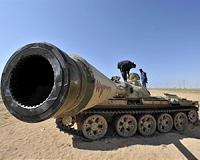| . |  |
. |
Sanaa, Yemen (UPI) Mar 29, 2011 Yemeni President Ali Abdullah Saleh seems to be hanging on to power by his fingernails amid ever-growing pressure to step down after ruling for 32 years. His army has splintered and his longtime tribal allies are deserting him, leaving him dangerously exposed as violence in Yemen, the most impoverished state in the Arab world, gets worse by the day. Leaked U.S. diplomatic documents say he tried to get Saudi Arabia's rulers to kill the general who now heads the opposition howling for Saleh's departure in an uprising that began in January amid political turmoil across the Arab world. The Saudis have little love for Saleh, who has been in power since 1978. But the rapidly deteriorating crisis in neighboring Yemen, where al-Qaida has a highly dangerous organization, exposes the House of al-Saud to grave dangers at a time when it feels threatened by Iran. So, for now at least, Riyadh is reluctant to let him fall and possibly trigger a civil war. But as Saleh's power erodes, Riyadh may end up not having a choice and making its own deals with Yemen's tribal leaders, as it has so often in the past. "Saudi Arabia's future is intimately linked with that of Yemen, a situation that poses a potential danger of the kingdom," says analyst Michael Horton of the Jamestown Foundation, a Washington think tank. "Despite an at times contentious relationship with President Saleh, the Saudis cannot in any way be happy about his likely departure and what this will mean for Yemen." Saleh suffered a major blow when Maj. Gen. Ali Mohsen al-Ahmar, his longtime confidant and the powerful military commander in the northwest region, defected March 21 and announced his support for the revolution. Minutes later, tanks of the Republican Guard, which is commanded by Saleh's son and chosen successor, Col. Ahmad Saleh, rolled into the capital to confront the defectors. Ahmar, Saleh's half-brother and commander of the elite 1st Armored Division, is one of Yemen's most important military leaders and has been seen by some as a successor to the aging Saleh. Ahmar has long been at odds with Saleh and his family. According to documents obtained by WikiLeaks and published Monday by the Norwegian daily Aftenposten, last winter Saleh tried to trick the Saudi air force fighting Houthi rebels in northern Yemen -- to help out Saleh, by the way -- to bomb the general's headquarters. Saleh identified the building as "insurgent headquarters" but the mission was aborted when the Saudis figured out what it really was. Ahmar's change of allegiance encouraged other senior figures in the regime, including army officers, ambassadors, regional governors and party luminaries, to resign or declare their support for the protesters. Indeed, the leader of the general's tribe, Hamad al-Ahmar, one of Yemen's wealthiest citizens and a longtime rival of Saleh's, aligned his people, including his well-placed brothers and relatives, against Saleh in a high-profile stand Feb. 26. The trigger was Saleh's dogged refusal to stand down and to stay in power until his term expires in late 2013, despite the rising clamor for his immediate departure amid the regime's increasing violence against protesters. One brother remains behind Saleh, Sadeq al-Ahmar, who heads the most powerful tribal confederation, the Hashid. Tribal loyalties can never be taken for granted. Tribal chiefs invariably go where the money is and Saleh could possibly buy back those who have stood against him. After all, he's stayed in power since 1978 by manipulating tribal alliances and wealth distribution. But even so, faced with a swelling northern rebellion by the Shiite Houthi tribes, a secessionist revolt in the south, a crumbling economy and al-Qaida's growing strength, Saleh is being steadily boxed into a corner. He may be down, but he's not out -- yet. "Unfortunately, the president and his sons still have control over powerful sections of the military, including the Republican Guard and the air force," observed Yemeni politician Abdul Irayani. "We're all praying that Saleh leaves quickly and quietly." "The regime's crumbling," declared Mohammed al-Naqeeb, a senior official of the ruling party in the south and one of those who quit. "There's very little support left for the president now." The Saudis have long dealt with the Ahmars. Riyadh may now be looking to them as a solution.
Share This Article With Planet Earth
Related Links
 Rebels pledge to forgive Kadhafi turncoats
Rebels pledge to forgive Kadhafi turncoatsBenghazi, Libya (AFP) March 28, 2011 Libya's rebel National Transitional Council vowed Monday they would forgive supporters of Colonel Moamer Kadhafi as long as they turned their backs on the leader whose forces have been pushed back under fierce coalition airstrikes. "We ask the people around Kadhafi to abandon him. If they do so, we will forgive their wrongdoings," the main spokesman for the government-in-waiting, Abdulhafiz ... read more |
|
| The content herein, unless otherwise known to be public domain, are Copyright 1995-2010 - SpaceDaily. AFP and UPI Wire Stories are copyright Agence France-Presse and United Press International. ESA Portal Reports are copyright European Space Agency. All NASA sourced material is public domain. Additional copyrights may apply in whole or part to other bona fide parties. Advertising does not imply endorsement,agreement or approval of any opinions, statements or information provided by SpaceDaily on any Web page published or hosted by SpaceDaily. Privacy Statement |